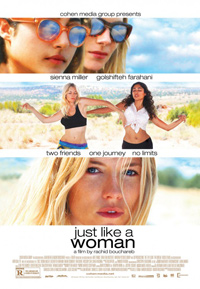Reviews
Just Like a Woman | Review
Female Trouble: Bouchareb’s Understated First Chapter in Arab-American Trilogy
 Algerian filmmaker Rachid Bouchareb, perhaps most widely recognized for his films Outside the Law (2010) and Days of Glory (2006), depicting historical and divisive conflicts between Algeria and France, returns once again to the US with Just Like a Woman, the first film of a planned trilogy depicting the transforming relationships between the Western and Arab world. A female centric road film born out of severe character conflicts created by their oppressive, male dominated existence ensures that the film will be rampantly compared to Ridley Scott’s Thelma & Louise (1991), even though it avoids an overtly melodramatic malaise. Shining through its formulaic setup and stereotypical antagonists are a pair of actresses that manage to fit perfectly with Bouchareb’s knack for uniting people despite of their socially constructed differences.
Algerian filmmaker Rachid Bouchareb, perhaps most widely recognized for his films Outside the Law (2010) and Days of Glory (2006), depicting historical and divisive conflicts between Algeria and France, returns once again to the US with Just Like a Woman, the first film of a planned trilogy depicting the transforming relationships between the Western and Arab world. A female centric road film born out of severe character conflicts created by their oppressive, male dominated existence ensures that the film will be rampantly compared to Ridley Scott’s Thelma & Louise (1991), even though it avoids an overtly melodramatic malaise. Shining through its formulaic setup and stereotypical antagonists are a pair of actresses that manage to fit perfectly with Bouchareb’s knack for uniting people despite of their socially constructed differences.
Down and out Chicago receptionist Marilyn (Sienna Miller) is struggling to make ends meet while her out of work and distant husband George (Tim Guinee) continually disrespects her. She has a passion for belly dancing, and has long been hoping to enter a significant dance contest in Santa Fe. Marilyn is a friendly acquaintance of Mona (Golshifteh Farahani), an Arab woman who arrived five years ago from her native country to marry Mourad (Roschdy Zem), now living an unhappy existence as she helps her husband run his convenience store while being the constant victim of her vicious mother-in-law’s threats to either get pregnant or prepare to be replaced by a more fertile female.
Certain dramatic circumstances occurring at around the same time in both their lives sees them unite on the road in a desperate attempt to get the hell out of Dodge, and Marilyn quickly utilizes the equally attractive Mona as her new dance partner as they belly dance their way through various hovels on the way to Santa Fe. Embracing the freedom of the wide open spaces on the way to their final destination, the two women continually encounter the vicious realities of a harsh world where either gender or racially motivated hatred thwarts them.
Just Like a Woman opens with a shot of Farahani’s exposed abdomen in the midst of a fertility ritual performed at her mother-in-law’s insistence, the narrative literally born from the anatomy in question. Functions of the female form, both as a vessel for procreation and provocation, is the obvious motif throughout the film, where their abdomens (and eventually their characters) are determined to be interchangeable for multiple roles at the will of the world they aren’t in charge of. Bouchareb, who delights in either the conflicts of disparate peoples or their profound unifications (as in his 2009 film London River), interestingly seems to be teasing that cultural and religious barriers may be trampled under certain circumstances, but little seems to have changed, even in the supposedly enlightened Western world, in matters pertaining to rampant misogyny. In fact, Just Like a Woman is punctuated with a vicious instance of violence that is as unnervingly frustrating as it is surprisingly shocking despite its simplicity.
Sienna Miller turns in an effortless and subtle performance as Marilyn, her most effective film presence since her role in Steve Buscemi’s 2007 version of Interview. She’s a harried and non-descript beauty here, and even takes a backseat to the more abjectly desperate and effervescent character played by Farahani. Roschdy Zem, a regular player in Bouchareb’s filmography, takes an understated back seat this time around, though the same can’t be said for the other film’s antagonists. Marilyn’s husband and Mona’s mother-in-law often come across as caricatured attempts at despicable archetypes.
Thankfully, Christophe Beaucarne’s utilizes the pristine landscapes customary of the road trip film, and despite some noticeable missteps, the screenplay from Marion Doussot and Joelle Touma (who also penned The Attack) is an effectively wrought portrait of two seemingly different people helping each other out. Bouchareb perfectly utilizes The Kills’ track “The Last Goodbye” to conclude on a melancholy and bittersweet final note, marking the beginning of what promises to be a provocative trilogy.
























